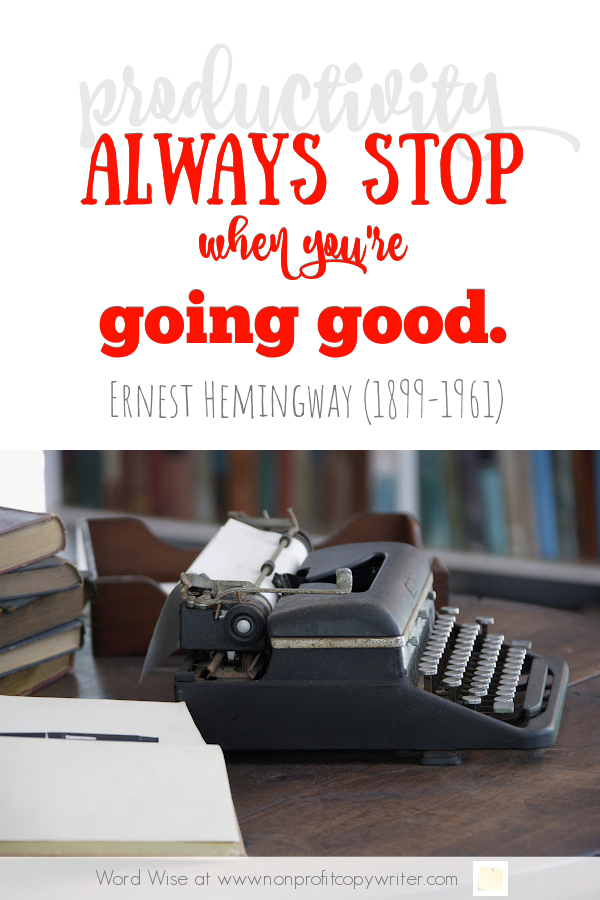Save Time: Get 5 Simple Writing Tips
you can put to use in 10 minutes
Don’t Finish Writing – and Get More Done
Award-winning writer Kathy Widenhouse has helped hundreds of nonprofits and writers produce successful content , with 750K+ views for her writing tutorials. She is the author of 9 books. See more of Kathy’s content here.
Updated 11.16.24
It was time to write my weekly blog post. I drafted a rough outline. But I just couldn’t finish writing the thing.
Fortunately, I had a day or two before I had to publish the article. So I left myself hanging in the middle of a paragraph. The next day, I sat down at the keyboard to finish writing and completed the piece quickly.
You’re reading it.
Don’t finish writing
If you want to be a more productive writer, do what legends have done. Stop writing in the middle of a project or a section or paragraph – or even in the middle of a sentence. Then, the next day or the next writing session, pick up where you left off.
It’s called The Hemingway Trick, attributed to American novelist and Nobel laureate Ernest Hemingway (1899-1961), who churned out 16 books. "The best way is always to stop when you are going good and when you know what will happen next,” explained Hemingway in an October 1935 interview with Esquire. “If you do that every day when you are writing a novel, you will never be stuck.”
It works because our brains dislike unfinished business.
Interruption? Yes, please.
Hemingway put into practice what psychologist Maria Ovsiankina, Ph.D., (1898-1993) had documented in her 1928 doctoral dissertation: people resume unfinished tasks to satisfy their need for closure.
Our brains don’t like incompleteness or half-baked projects or partial credit.
In her 1928 dissertation, Maria reported what happened when people were interrupted during a task and then later given free time. Her subjects almost always returned to the suspended task – voluntarily and eagerly – to finish it.
Today, experts have a term for the need to complete: The Ovsiankina Effect.
In our busy world, unfinished tasks have been identified as a significant job stressor. Employees struggle to “leave work at the office.” Instead, they “just spend a bit of time on this over the weekend.”
But the Ovsiankina Effect need not always lead to unhealthy habits like those.
You, as a writer, can harness the tendency for your benefit. That urge you have to get back to the desk to flesh out an idea you started to write about yesterday? Take advantage of your need to complete it. Deliberately leave that bit of content undone.
You’ll be impatient get back to the computer the next day.

Your Content Calendar Template
Plan and track your published content with this fillable and re-usable worksheet.
Don’t finish writing today. Get more done tomorrow.
That’s what happened to me with this article. I had a blogging schedule to follow. I had a topic. But I had very little motivation … until I started writing about Maria and her dissertation.
Once I got engaged, I stopped. My self-imposed interruption created momentum for my next writing session. And I finished the draft quickly.
When you stop writing while you still have a clear idea of what comes next, you're motivated to pick up where you left off when you start writing the next time.
Stuck? Don’t finish writing. Leave yourself hanging until tomorrow.
More Productivity Tips
Make Writer's Distraction Work For You ...
Beat Writer’s Block When You Eat the Frog First ...
My Favorite Writing Productivity Hack: It’s Not about Writing At All ...
Wannabe Writer? Say Goodbye to Your Worst Enemy ...
Beat Writer's Procrastination with a Simple Flip ...
Start Your Writing Day With a Quick Win and Get Momentum ...
Manage These 3 Big Distractions When You’re Writing At Home ...
How To Write Faster: Use Bursts AND Binges ...
More Freelance Writing Tips on our Pinterest board ...
Return from Don't Finish Writing to Nonprofit Copywriter home
As an Amazon Associate I earn from qualifying purchases.
Share This Page

Named to 2022 Writer's Digest list
BEST GENRE/NICHE WRITING WEBSITE


Stop Wasting Time!

Grab your exclusive FREE guide, "5 Simple Writing Tips You Can Put to Use in 10 Minutes or Less"











